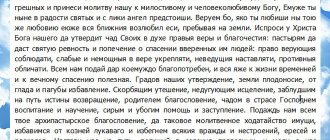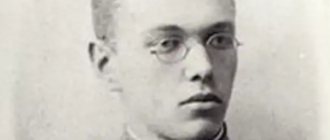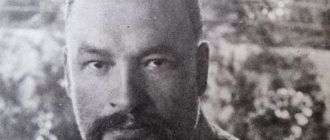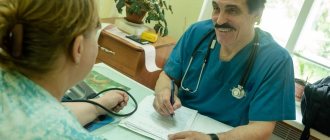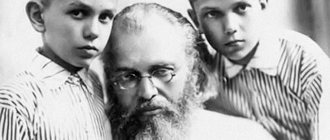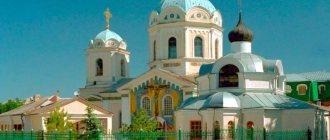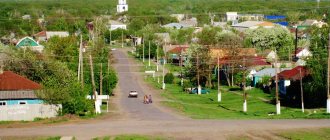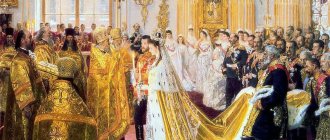“...The Lord created medicines from the earth, and a prudent person will not neglect them...” says the Holy Gospel of Mark (Sir. 39: 1-2, 4). The Lord created people whom he endowed with medical powers so that they could heal people from various diseases. A person who loves and honors God will not neglect his health, but will use in time what the Lord has given him.
The Society of Orthodox Doctors is a professional association of doctors of various specialties who profess a single Orthodox faith. The society was created in honor of St. Luke.
The Society of Orthodox Doctors is an association of doctors of various specialties who profess the Orthodox faith. The society was created in honor of St. Luke
Saint Luke - showed everyone an example of combining the ministry of an archpastor and a doctor
The name of St. Luke is now quite famous. The holy saint of God, Luke, appeared in the image of a good shepherd who heals ailments not only of the soul, but also of the body. It was he who set an example of combining the ministry of archpastor and doctor. By his feat, he showed that there is such a bearing of the cross of Christ.
The holy saint of God, Luke, appeared in the image of a good shepherd who heals ailments not only of the soul, but also of the body. It was he who set an example of combining the ministry of archpastor and doctor
Saint Luke - in the world Valentin Voino-Yasetsky was born in Kerch in April 1877. After graduating from high school, he firmly decided that he wanted to devote his life to suffering people, so he chose medicine.
Afterwards, he began to engage in medical practice and scientific research.
Saint Luke was not only a priest, but also a good doctor.
In 1920, he worked as a surgeon in Tashkent, but also actively participated in church life. He attended church fellowship meetings. One day, Bishop Innocent of Tashkent told him: “Doctor, you need to be a priest.”
This was perceived as God's call. Afterwards, Valentin took monasticism with the name Luke. On May 30, 1923, he was secretly consecrated. But, Luke continued to serve as a doctor.
Saint Luke was both a priest and a doctor. It was he who created the Society of Orthodox Doctors
The saint died on June 11, 1961, on the day of All Saints who shone in the Russian land. But the saint did not abandon his flock; many miraculous healings were accomplished through his prayers. In 1996, the holy discovery of the remains of St. Luke took place.
Saint Luke is the patron saint of all doctors, which is why the society bears his name
Saint Luke is the patron saint of all doctors, therefore both the Society of Orthodox Doctors of Russia, abbreviated OPVR, and the Society of Orthodox Doctors of St. Petersburg bear his holy name.
The society itself was created in St. Petersburg, but there are many branches throughout the country, for example, Orthodox doctors in Moscow, Perm, Voronezh, Nizhny Novgorod and others.
Saint Luke is the patron saint of all doctors, which is why the Society of Orthodox Doctors of Russia bears his name. Very often on icons he can be seen dressed as a doctor.
There are 4 reasons why the Society of Orthodox Doctors was created:
- reduced moral and spiritual level of modern domestic medicine;
- exposure (detection, disclosure) of medical workers professing the Orthodox faith;
- a rather low level of Christian and spiritual compassion for persons who need medical care;
- a fairly widespread prevalence of magic, psychics and other occult techniques that influence the population.
The society has a distinctive sign - an angel that adorns the head of the Alexandrian pillar
The society has a distinctive sign - an angel that adorns the head of the Alexandria Pillar, against the background of the Russian flag. And also the red cross - as a symbol of medical care and medical art, which is enclosed in a circle, a symbol of eternity, as if uniting everything heavenly and earthly.
The society has a sign - an angel adorns the head of the Alexandria pillar, against the background of the Russian flag, and a red cross - as a symbol of medical care and medical art, is enclosed in a circle
The Society of Orthodox Doctors of St. Petersburg was created in February 1999 on the initiative of the charity department of the diocese and two fairly large sisterhoods of mercy. The first chairman of the society is the rector of the hospital parish of the Great Martyr and Healer Panteleimon, currently a doctor of medical sciences - Archpriest Sergius Filimonov.
The first chairman of the society is the rector of the hospital parish of the Great Martyr and Healer Panteleimon, Doctor of Medical Sciences - Archpriest Sergius Filimonov
The project of the Moscow Society of 1998 was taken as the basis of the society, which was slightly revised and approved at a general meeting of doctors. The goals and objectives of the Society of Orthodox Doctors were blessed by the Metropolitan of St. Petersburg and Ladoga - Vladimir.
Church and traditions of Russian medicine
On September 27, 2015, Archpriest Sergius Filimonov celebrated his 50th birthday. We congratulate him on his anniversary and wish him health and God's help in his multifaceted activities, because he is at the same time a professor at St. Petersburg State Petroleum Medical University and the First St. Petersburg State Medical University named after. acad. I.P. Pavlov, candidate of theology, doctor of medical sciences, editor-in-chief of the magazine “Church and Medicine”, member of the Executive Committee of the Society of Orthodox Doctors of Russia (OPVR) named after. St. Luke (Voino-Yasenetsky), Chairman of the Society of Orthodox Doctors of St. Petersburg named after. St. Luke (Voino-Yasenetsky), Archbishop of Simferopol and Crimea, rector of the Church of the Sovereign Icon of the Mother of God, practicing ENT surgeon of the highest category. Father Sergius was taught a love of medicine by his parents, doctors, and a love of God and people by Archbishop Luke. Father Sergius kindly provided his photographs to the St. Andrew the First-Called Foundation for the exhibition “St. Luke”, which was held in Moscow on June 5-6, 2014. (https://www.orthomed.ru/node/434). This exhibition was also seen by participants of the V All-Russian Congress of Orthodox Doctors (https://yadi.sk/d/tjC_ouv3jNBST). In 2016, it will be dedicated to the 100th anniversary of the defense of Valentin Feliksovich Voino-Yasenetsky’s doctoral dissertation “Regional Anesthesia”, the 70th anniversary of the date of Bishop Luka’s receipt of the Stalin Prize and transfer to the Simferopol Department, as well as the 20th anniversary of the acquisition of his holy relics and canonization as locally venerated saints in the Simferopol and Crimean diocese.
— Father Sergius, we met you in Kupavna at one of the conferences dedicated to the holy surgeon. We thank you and Svetlana Vladimirovna Lobodina for your help in organizing the exhibition “St. Luke”. It became known that it would take place on March 18, 2014, the day of the discovery of the relics of St. Luke. It was on that historic day that Vladimir Putin announced the return of Crimea to Russia. Before this, all residents of Crimea prayed to their Heavenly patron. You manage to combine serving God with the work of a doctor, following the example of St. Luke. What role did he play in your life?
- Huge. I try to tell my students at St. Petersburg Medical University about the personality and life path of the saint. It is a pity that many medical school graduates know little about it. Until I was 21, I also knew nothing about St. Luke. When I was a cadet at the Military Medical Academy, during the course of operative surgery, the teachers recommended to us his “Essays on Purulent Surgery” as a classic work on medicine. In Soviet times, we were not told that the author of this wonderful book was a clergyman. When I became a believing doctor and began to join the church, my spiritual father, Archpriest Vasily Lesnyak , brought his autobiography with the wish that I become like him, so that his life would become an example for me. Although I did not set such lofty goals as young Valentin Voino-Yasenetsky, I still wanted to serve people, help them in their sorrows and illnesses. I studied the iconography of St. Luke, and even gave a report on this topic. Having read the works and sermons of the saint, I was amazed by his versatility, titanic height and the power of his thought. It became clear to me that a person will not be able to create anything like this in his life if God does not help him. Thus, for me, through St. Luke, the light of Christ shone. I believe that it should be talked about anywhere and everywhere. I sincerely thank the St. Andrew the First-Called Foundation for providing us with an electronic layout of the photo exhibition. (https://yadi.sk/d/EKaIjC7Yghz99) After the congress, we will use it at our other events.
— Please tell us about the congress.
— The congress was held with the blessing of His Holiness Patriarch Kirill of Moscow and All Rus'. The congress was attended by clergy from 89 dioceses of the Russian Orthodox Church, representatives of regional branches of the Society of Orthodox Doctors of Russia, guests from Belarus, Ukraine and Kazakhstan, healthcare workers, medical students, nurses. The organizers of the congress were the Society of Orthodox Doctors of Russia, the Department for Church Charity and Social Service of the Russian Orthodox Church, the Department for Church Charity and Social Service of the St. Petersburg Diocese, the Government of St. Petersburg, the Society of Orthodox Doctors of St. Petersburg named after. St. Luka (Voino-Yasenetsky), Northwestern Federal Medical Research Center named after. V.A. Almazov and the Military Medical Academy named after. CM. Kirov. The forum began in the Church of St. Demetrius of Thessalonica in Kolomyagi, where delegates of the congress took part in the Divine Liturgy, which was led by the chairman of the Synodal Department for Church Charity and Social Service, Bishop Panteleimon of Orekhovo-Zuevsky.
The congress was dedicated to the issues of preserving and strengthening the traditions of Russian medicine, perpetuating the memory of famous doctors who made a great contribution to the development of world medicine, preserving the high title of a doctor, and cultivating a merciful attitude towards the individual patient. On October 3, we unveiled a memorial plaque to E.S. Botkin, the life physician of the family of the last Russian Emperor, and held an Interregional Forum of students of medical universities, which is of great importance for the education of physicians based on the examples of the life and service of doctors who remained faithful to their human and medical duty until the end of their lives.
— What problems were discussed at the congress?
— We discussed the following topics: “Modern problems of biomedical ethics”, “Pastoral and nursing service in the hospital”, “Counseling of persons with behavioral and mental disorders”, “Family relationship therapy”, “Orthodox fasting: nutrition and medicine”, “Legal aspects ministry of the Church in medical institutions”, “Features of pastoral support for mental patients”.
— Currently, society is widely discussing the proposal to legislators of His Holiness Patriarch Kirill of Moscow and All Rus' to remove abortion from the compulsory health insurance system. He said this on January 22, 2015 at the III Christmas Parliamentary Meetings held in the State Duma of the Federal Assembly of the Russian Federation within the framework of the XXIII International Christmas Readings. What do you think of it?
— Orthodox doctors of St. Petersburg actively support the proposal of His Holiness Patriarch Kirill of Moscow and All Rus'. I believe it is necessary to change the mindset of medical workers. Abortionist thinking dominates among doctors. In the event of any unfavorable factors in terms of the health of the mother or fetus, abortion is often immediately offered as a means of effectively solving the problem. However, many parents want to raise and educate their child, even if he is born sick, with defects and various deviations. The abortifacient mindset of doctors needs to be gradually changed to become a positive reproductive mindset, focused on life and not death. Without a doubt, to overcome such an evil as abortion, a set of measures is needed: assistance to families in resolving housing problems, material support for large families, introduction of ethical standards into the health care system that would encourage doctors to take care of preserving the life of a conceived child, curbing advertising and propaganda of abortion. . Patriarch Kirill spoke about this, proposing to remove abortion from the compulsory medical insurance system. In his opinion, this will not lead to an increase in the number of clandestine abortions, since the price of professional medical services should not be prohibitive.
— The initiative of the Primate of the Russian Orthodox Church caused a great public outcry. Discussions took place both in the media and on social networks. What could you say to opponents of the Patriarch’s initiative?
— The discussion also unfolded at our congress after the speech of Archpriest Dimitry Smirnov . The fact is that pregnancy is not a disease, and abortion is a treatment, therapeutic or health-improving manipulation, which the state must pay for from taxpayers (see: https://mitropolia.spb.ru/docs/beremennost-ne-bolezn- abortion-ne-treatment). Chairman of the Commission on Family Issues, Protection of Motherhood and Childhood of the St. Petersburg Diocese, Archpriest Alexander Dyagilev (see: https://sm.cnsr.ru/ru/analitics/lyudi_ne_ponimayut_osnov_semejnoj_zhizni_i_printcipov_dialoga/) speaks about the need for real support for pregnant women, single mothers and large families, about the importance of the emergence of chaste family educational programs that promote Christian family values. Father Alexander believes that when developing the bill, however, one must not forget to take into account that there is an abortion for medical reasons with a direct threat to the life and health of the woman. The chief physician of the Soul Care Center of the Society of Orthodox Doctors of St. Petersburg, obstetrician-gynecologist of the Center for Fetal Medicine, Yulia Toropkova , believes that removing abortion from the services of the compulsory medical insurance system will allow a believing doctor to refuse to carry out this manipulation, incompatible with his religious or moral principles, without the risk of being left without work. Yulia Yuryevna is one of 150 members of the Society of Orthodox Doctors of St. Petersburg. These are doctors of various specialties who profess the Orthodox faith. We also have associate members of the Society - teachers, psychologists, nurses and students who do not have a diploma from a medical university.
— Please tell us about the Society of Orthodox Doctors of Russia named after St. Luke (Voino-Yasenetsky).
— On September 29-30, 2007, the First All-Russian Congress of Orthodox Doctors was held in Belgorod, at which representatives of 49 dioceses of the Russian Orthodox Church decided to create this all-Russian public organization. OPVR is a voluntary, self-governing non-profit public association. On October 12 of the same year, His Holiness Patriarch Alexy of Moscow and All Rus' blessed the activities of the Society of Orthodox Doctors of Russia, giving it the name of confessor and physician St. Luke. The Society operates in accordance with the Constitution of the Russian Federation, the Federal Law “On Public Associations”, other current legislation of the Russian Federation, is guided by generally accepted principles and norms of international law and its own Charter, while respecting and observing the Charter of the Russian Orthodox Church. OPVR builds its activities on the principles of equality of its members, legality, transparency, voluntariness and self-government.
— What are the goals and objectives of the Society of Orthodox Doctors of Russia?
— The main goal is to unite existing and newly emerging regional societies of Orthodox doctors into a single organization, the main focus of which is to introduce Christian values into Russian medicine and improve the quality of health of citizens of the Russian Federation. The main task of the Society is to improve medical care for Russians and spiritual healing on the part of the clergy of the Russian Orthodox Church, the provision by Orthodox doctors of feasible free professional medical care, understood as service to a suffering person.
— On June 18, 2015, an Agreement on Cooperation was signed in Moscow between the Russian Orthodox Church and the Ministry of Health of the Russian Federation. A separate article is devoted to joint work to prevent abortions. What are the prospects for such work?
— The agreement involves the development of crisis pregnancy centers at maternity hospitals with the participation of psychologists and representatives of the Russian Orthodox Church, the participation of representatives of religious organizations in pre-abortion counseling of women in medical organizations. Today in Russia there are more than 50 church centers for the protection of motherhood, 27 church shelters for women with children and pregnant women in crisis situations, 26 of which have been created in the last 5 years. There are about 30 humanitarian aid centers operating in the Church, and pre-abortion counseling for women is provided in antenatal clinics in more than 25 dioceses. The Society of Orthodox Doctors of St. Petersburg, along with other problems, also deals with the problem of abortion, prenatal diagnosis, and contraception.
— In the book by Mark Popovsky, “The Life and Life of St. Luke Voino-Yasenetsky, Archbishop and Surgeon,” it is described how Valentin Feliksovich once kicked a pregnant woman out of his office and for a long time could not calm down, angrily telling his wife that the girl demanded that the child be taken out. I'm sure you would do the same. What should a woman know about the consequences of abortion?
“She must know that the blood of murdered babies cries out from the ground.” In the Holy Scriptures, God Himself is “the protector of the weak” (Jude 9:11). The command “Do not kill a child by causing a miscarriage” is in the “Teaching of the Twelve Apostles.” Abortion poses a serious threat to the physical and spiritual health of the mother, not only because of female diseases. By terminating a pregnancy, a woman challenges God, thereby exposing herself to the danger of remaining alone, losing family and friends, and becoming disabled. Only in the case of a direct threat to the life of the mother is it recommended in pastoral practice to show leniency. The Church does not reject women who have had an abortion, but calls them to repentance, prayer and penance, followed by participation in the saving sacraments.
— A special group “Helping Young Mothers” has been created in your Church of the Sovereign Icon of the Mother of God. Tell us about her, please.
— By May 2008, when the idea of creating our group first arose, there were eight young families in the parish, more than a hundred children and about fifteen women who had problems in the reproductive sphere or were pregnant. Our group is a division of the Society of Orthodox Doctors. We cooperate with the St. Petersburg Breastfeeding Fund, the crisis fund at the Novodevichy Convent, the St. Demetrius of Thessalonica Foundation, the obstetric department of the Gatchina Central Regional Clinical Hospital, the Medical Genetic Center, the hospital named after. S.P. Botkin, obstetric department of St. Petersburg State Medical University named after. I.P. Pavlova, maternity hospital No. 9 and other medical institutions of the city.
— What goals and objectives does the group have?
— The purpose of creating our group is professional medical assistance and spiritual care for pregnant women and lactating women, counseling infertile couples, assistance in child care issues, baptism of newborns in serious condition, organization of pilgrimage trips. The main thing, of course, is preparation for a natural, normal birth and assistance to women whose pregnancy is complicated. We distribute all women to sponsored maternity hospitals.
— Are only your parishioners turning to you for help?
- No. Women also come from other churches in St. Petersburg, other dioceses and cities of Russia, wives of priests and even unchurched women who have had negative experiences with government medical institutions. It happens that you have to resolve issues related not only to infertility treatment methods, but also to the choice of maternity hospital. In recent years, there has been “obstetric aggression” in Russian maternity hospitals. Where can an Orthodox woman find a competent obstetrician-gynecologist who can understand her psychological characteristics and correctly deliver the child? One day a woman with diabetes came to us. She was told that we would not persuade her to terminate her third pregnancy. The two previous pregnancies were difficult, as diabetes decompensated during them. She gave birth to two children and dreamed of having a third child.
— How can you contact the specialists in your group?
— To get an appointment with a doctor at one of the medical and diagnostic institutions in the city with which we cooperate, you need to contact through the website of the Society of Orthodox Doctors or through its dispatch center. It is also possible to contact the temple secretariat by appointment.
— Sometimes the purpose of abortion is to “supply” tissues and organs of human embryos, aborted at different stages of development, for the treatment of various diseases and “rejuvenation” of the body. How should we approach this phenomenon?
- This is simply blasphemous. The Council of the Russian Orthodox Church determined that the use of fetal therapy methods is unacceptable. Condemning abortion as a mortal sin, the Church cannot justify the destruction of a conceived human life, even if the effectiveness of “rejuvenation” therapy is scientifically proven. She is a crime and an example of gross immorality.
— What is the main reason for infertility in women?
— There are more than 30 medical reasons for infertility, but there are also spiritual reasons. A believing married couple needs to begin by carefully examining the quality of their Christian life and comprehending everything that is happening together with their confessor. It is important to identify ancestral and family sins that may interfere with childbearing. If a marriage is not sanctified by the Church, it is necessary to get married. Spouses must regularly participate in such church sacraments as confession, communion, and unction. Parishioners of our church several times made pilgrimage trips to Cyprus to the Cyprus Icon of the Mother of God, where a huge number of women of different ages and nationalities prayed. Almost all of them found the long-awaited pregnancy. In Russia, each diocese has its own miraculous places and shrines that have healing powers and help with infertility. Along with the spiritual care of the spouses by the priest, doctors are involved in their treatment. Over the course of a year or two, the spouses become church members and undergo treatment. If pregnancy does not occur during this time, the situation is released to the will of God, and the couple can accept an adopted child from the family.
— Is ultrasound diagnostics dangerous for pregnant women?
— It is strictly unacceptable to perform an ultrasound at 3-6 weeks of pregnancy without extreme indications, if there is no suspicion of an ectopic or disturbed pregnancy. The first planned ultrasound is performed at 11-15 weeks of pregnancy. At this time, it is possible to identify a “frozen”, undeveloped pregnancy. The use of ultrasound is justified for the purpose of early detection and treatment of fetal diseases or threats to the woman’s life. The most difficult thing is when a defect incompatible with life is detected in the fetus and the question arises of terminating the pregnancy for medical reasons. The task of our service in such a situation is to provide the woman with complete, verified information about the state of her health and the pathology of the fetus, so that she can calmly make an informed decision without pressure from others, including the antenatal clinic doctor. The woman makes the final decision only with the blessing of her confessor.
— What are the advantages of an Orthodox doctor in treating a patient?
“It is very important, for example, to have time to christen “fear for the sake of mortals” babies who were born with pathology and are in serious condition. If there is a doctor or nurse next to a “severe” baby who can baptize him, then his chance of survival is much higher than that of unbaptized children with the same disease. In just one year, 98 babies in our group were baptized with this rite, of which 7 babies died. Obstetrics is one of the most conservative specialties, but in recent years the time of childbirth has been reduced by almost half, and instead of the required 16-18 hours, women give birth for 6-8 hours, which is why the number of cases of birth injuries in women and babies has increased. Up to 2/3 of children are now born with somatic pathologies and diseases of the central nervous system. Natural childbirth requires a lot of time and effort; it is not technologically advanced. Our maternity hospitals are fighting for the title of child-friendly maternity hospital. Individual or family births are offered, but it is not the status of the maternity hospital that is important, but the head and hands of the doctor. In order to treat not a disease, but a person, a doctor must have certain philosophical and religious beliefs. It is very important that not only the woman, but also the obstetrician-gynecologist pray before giving birth. In some maternity hospitals, women are scolded for bringing icons with them. To reduce the percentage of “obstetric aggression”, we refer our patients to specific doctors in sponsored maternity hospitals.
— At the congress, much attention was paid to the mental ill health of people. How would you comment on the fact that on September 7, 2015, a doctor was killed by a patient at the Road Clinical Hospital in St. Petersburg?
— Patients who undergo plastic surgery tend to have a somewhat frivolous attitude towards medicine. Often they have mental changes. Abroad, such patients must be examined by a psychiatrist before surgery. This is not the case in Russia, but if a patient has this kind of abnormality, the result of the surgical operation will simply be reduced to zero - the patient will still not like it, and he will go for surgery a second, fifth, tenth time. A doctor can do everything perfectly, but then some complications or deviations will arise due to reasons beyond his control, because the human body is not a machine, and a doctor is not a sculptor. Mutual understanding is important in the relationship between patient and doctor. The main cause of conflicts is the doctor’s inattention to the patient or the patient’s inadequate perception of the information provided by the doctor. Therefore, it is based on an initial meeting between the doctor and the patient, a detailed conversation, discussion of possible options for complications and ways out of them. When a patient enters a clinic for treatment, especially for surgical treatment, he is offered informed consent. The patient is warned about how the treatment will be carried out and what negative consequences it may lead to, because any operation has a certain risk, when, for example, death can occur in 80% of cases. And the patient himself decides whether to undergo surgery. Whether he falls into this 20% depends not on the doctor or the patient, but on the characteristics of the body, and, first of all, on the will of God. It happens that the doctor does not explain all the possible risks well. It happens that the patient’s mentality does not allow him to critically assess the consequences. He thinks that everything will go smoothly, bad things will not affect him. But each organism has its own characteristics of functioning, features of constitution, age, gender, etc. Unfortunately, the situation in Russian medicine is such that when a doctor has a corridor full of patients, he has no time to talk. The standards that are adopted today in various specialties, especially in the outpatient clinic, do not allow the doctor to adequately communicate with the patient and explain to him the specifics of the procedures being performed. Considering the workload of doctors, patients should clarify everything that worries them at the pre-hospital stage, fully find out what kind of treatment is ahead, and be attentive to the recommendations and conclusions of doctors.
— Father Sergius, thank you for the interesting conversation and wish you health and God’s help in your multifaceted activities.
Interviewed by Irina Akhundova
PS. Publications about Saint Luke of Crimea:
“The tale of how an archbishop-doctor and a doctor-cosmonaut save the life of a diabetic doctor”: https://sv-luka.prihod.ru/publicationscat/view/id/1139216
https://sv-luka.prihod.ru/obyavleniya/guid/1139888
https://ricolor.org/rus/rz/zo/22_5_11/2/
https://ricolor.org/rus/rz/zo/22_5_11/30_5_11/
“Saint Luke is a bishop-physician. Through miracles and after one’s death - in the service of medicine": https://sv-luka.prihod.ru/publicationscat/view/id/1166075
“How St. Luke became a Greek saint”: https://sv-luka.prihod.ru/publicationscat/view/id/1139216
“Saint Luke of Crimea: a miracle with a little pianist”: https://sv-luka.prihod.ru/publicationscat/view/id/1128839
Interview with Nazar Stadnichenko: https://ricolor.org/rus/rz/zo/22_5_11/3/
https://sv-luka.prihod.ru/publicationscat/view/id/1128839
“Saint Luke (Voino-Yasenetsky): “The wounded saluted me ... with their feet”:
https://sv-luka.prihod.ru/publicationscat/view/id/1123493
Metropolitan Nektarios (Antonopoulos). The path with Saint Luke: https://www.pravoslavie.ru/put/71410.htm
Archpriest Alexy Gomonov: Miracles immediately began from the icon of St. Luke: https://www.pravoslavie.ru/put/71396.htm
https://www.orthomed.ru/node/434
https://sm.cnsr.ru/ru/analitics/»pomosh__priniknet_s_nebes»/
See also materials from the OPV St. Petersburg website:
What is the Orthodox view of family, childbirth and the causes of infertility? https://www.opvspb.ru/faq/pravoslavnyy_vzglyad_na_semyu_problemy_detorozhden/ Interview with Archpriest Sergei Filimonov Chairman of the OPV of St. Petersburg named after. St. Luke (Voino-Yasenetsky), Archbishop of Crimea on the problem of infertility.
Help will come from heaven (Problems of abortion, prenatal diagnosis, contraception, etc.).
The peculiarity of the society’s work is to provide assistance in physical and mental illnesses
In this society, doctors help people with various diseases not only as doctors, but also as clergy and priests. People who simply need purely spiritual help can come here.
Members of the society work in many medical schools and hospitals. At their workplaces they provide consultations to all those who have asked for help.
Among the members of the society there are 6 doctors, 9 candidates of science, and 24 doctors with the highest category.
42 people
have work experience in their specialty for more than 10 years, and some for more than 30 years
There is such a form of medical work as medical patronage. It is characterized by long-term medical dynamic observation, as well as supervision of clergy and some laity by the same doctors.
There is also such a form of service as consultative and diagnostic outpatient care. Those who turn to the Society for help have the right to receive inpatient treatment and first aid, both in a hospital and in a clinic.
Treatment on the basis of the Counseling Center is a form of providing medical care to somatic and psychoneurological patients who have suffered after some kind of magical defeats. In this case, the presence of a shepherd is mandatory.
The Society of Orthodox Doctors has four sections: general medical, psychological and psychiatric, narcological and associative. Each section has its own specialist who develops his own specific research and educational topic.
The topic considered afterwards is considered at meetings of the Society and then brought to the plenary session. These meetings take place every month and are publicly open. On average, up to 150 people attend such meetings. And sometimes there were up to 600 people. Also participating in the meetings are those who then submit the materials of the reports for discussion in the press, radio or television.
^ Moscow Medical Academy named after I.M. Sechenov
The rector of our medical academy, academician Mikhail Aleksandrovich Paltsev, himself was the initiator of the revival of hospital churches at the Devichye Pole clinics. In everything related to the spiritual care of the sick and suffering, he always meets halfway; now we have three churches at the academy: a large one in the name of Michael the Archangel, a small one in the name of Demetrius of Prilutsky, and the surgical center has its own home church. Looking at the management, and the whole team began to catch up, priests regularly visit the clinic. Meetings of the medical section of the International Christmas Readings are also held on the territory of our academy.
The Society of Orthodox Doctors has its own official website
The Society of Orthodox Doctors has its own official website. The chairman of the society is an otolaryngologist surgeon, doctor of medical sciences - Archpriest Sergius Filimonov.
Official website of the Society of Orthodox Doctors of St. Petersburg
The highest body of the Society is the meeting of its members. There are gaps between meetings, which are led by the Board. It is elected for one year and is headed by a chairman. The Board of Trustees is currently continuing to be created, and includes its own composition of people who want to help the Society in matters of financing.
Doctors are people who treat people’s illnesses, and Orthodox doctors also treat mental illnesses
Orthodox doctor is a combination of words that is completely unusual for us. Doctors are people who treat people's illnesses. But what is the connection? Does it really exist? Yes, the connection really exists, and even more than that, its absence makes our medicine one-sided and incomplete.
A person considers himself to have two worlds - the spiritual and the material. If you separate them, then a person will cease to be a person. In earthly life, a person needs a body, and the body needs a soul.
The Church distinguishes three levels of organization of the human structure: physical, spiritual and mental.
It is in accordance with this that diseases are divided into spiritual and mental. Medicine, at its core, relieves bodily suffering. And psychiatry deals with mental illness, but most psychiatrists don’t even know about the existence of the soul.
But sometimes people often get sick with spiritual illnesses. Such diseases include sins, passions, and vices that separate a person from God further and further. Diseases are treated only under the auspices of the Russian Orthodox Church.
When a person’s healthy spirit is even slightly damaged, the soul becomes obsessed with unclean passions, after which the body begins to be subject to various diseases. It is this understanding that distinguishes an ordinary doctor from an Orthodox doctor.
Real medicine has a fairly wide range of medical services, which on many points contradicts Orthodox morality. For example, what suits some people does not suit others.
^ "Black Square"
Only some professions can be purely Orthodox, including Orthodox medicine, Orthodox pedagogy, Orthodox art. Where we are talking about contact with the life of the spirit, there may be an Orthodox specialist. A teacher deals with the education of the soul, and so does an artist. Is this significant? Are there creations opposed to the Creator? As much as you like. “Black Square” by Malevich, for example, or those artists who exhibited blasphemous works at the Sakharov Center, or the same abstractionists. When the disintegration of form, the destruction of God’s creation is depicted, then, in my opinion, this is already a departure from God. I asked what art is, from their point of view, of many people of art, for example, the outstanding musician Svyatoslav Teofilovich Richter, the prominent art critic Viktor Mikhailovich Vasilenko and others, and they said, approximately the same: “art is the identification of God in the world around us, ways of knowing God." When an artist, a cultural figure, even an actor, approaches this understanding, he is Orthodox, but if he only shows disgust, abomination, if he poetizes evil, then he is not Orthodox.
The Society of Orthodox Doctors has its branches in many cities of Russia
As mentioned earlier, the Society of Orthodox Doctors has its branches in many cities of Russia. In Moscow, the Society of Orthodox Doctors is located at the address: B. Pirogovskaya Street, 6. The chairman is Alexander Viktorovich Nedostup.
In Novosibirsk there is a medical center of the Society of Orthodox Doctors in honor of the “Healer” icon of the Mother of God. In Cheboksary the company is located at: st. Kalinina, 1. The chairman is priest Mikhail Pavlov.
Most recently, the second All-Russian Congress of the Society of Orthodox Doctors was held in Voronezh. The head of the Moscow Society, Professor Alexander Viktorovich Nedostup, talks about the current society of Orthodox doctors - there are 43 regional branches, in which there are about two thousand doctors with various medical specialties and skill levels.
He also noted the fact that such a small number in society is explained by the fact that doctors are men. And in medicine, it is mostly women who work.
Archpriest Sergius Filimonov: “The Society of Orthodox Doctors is 43 regional branches, in which there are about two thousand doctors with various medical specialties and skill levels”
At this congress they discussed the report “The Church and Modern Medical and Social Reality” by Metropolitan Sergius. There was also a report on the threat of alcohol, which is quite popular these days. Such a dominant topic as human diseases of the 21st century was also discussed.
During interviews, he was often asked whether the demand among patients for believers, that is, Orthodox doctors, was growing. He answered that most believers still prefer to be treated by Orthodox doctors. Non-Orthodox people don’t really care.
Sometimes people come, but do not understand at all how an ordinary doctor differs from an Orthodox one.
Many people believe that Orthodox medicine treats with some kind of herbs and massage.
But not all people understand that essentially the methods of treating diseases are the same as usual.
The doctor usually explains to everyone that the equipment of an Orthodox doctor is his eyes and hands, only they can see mental illnesses.
^ Funding
The fact that the cost of treatment is now being transferred to the shoulders of the poor, semi-poor and destitute people, doesn’t this have something to do with the Divine principle? The healthcare system that existed under Soviet rule is still closer to God than the medicine that is supposedly being created now in order to “return Russia to a civilized society.” Such a return is more like entering the kingdom of the Antichrist, because taking the last money from a person for what society is obliged to give to its suffering, sick citizen is a crime. A civilized society, in my opinion, should act like the Good Samaritan. Actually, that’s how it used to be: contributions went into the state pot. The state carved out what was left from rockets and heavy metallurgy for medicine. There wasn’t enough, but still, more or less everyone received equal medical care. The commercialization of our medicine is a shame.
